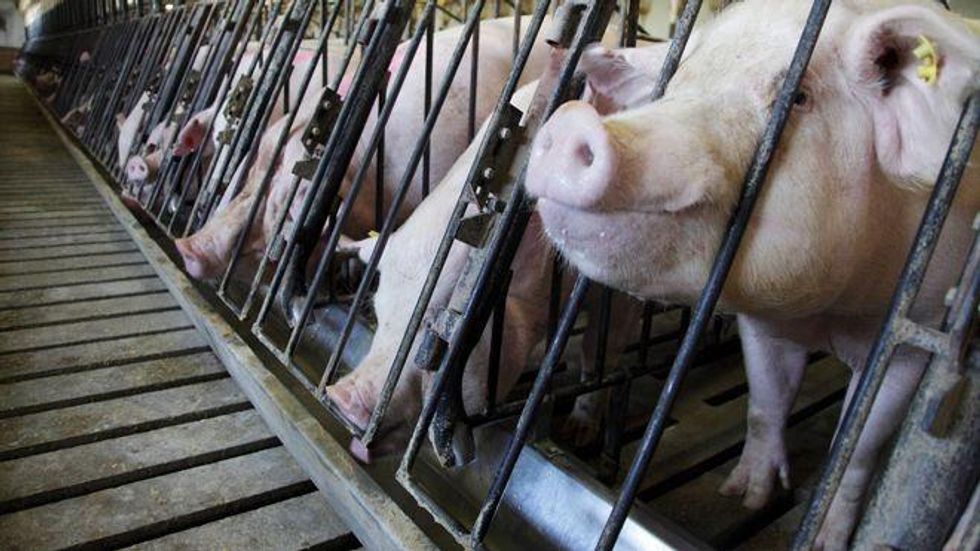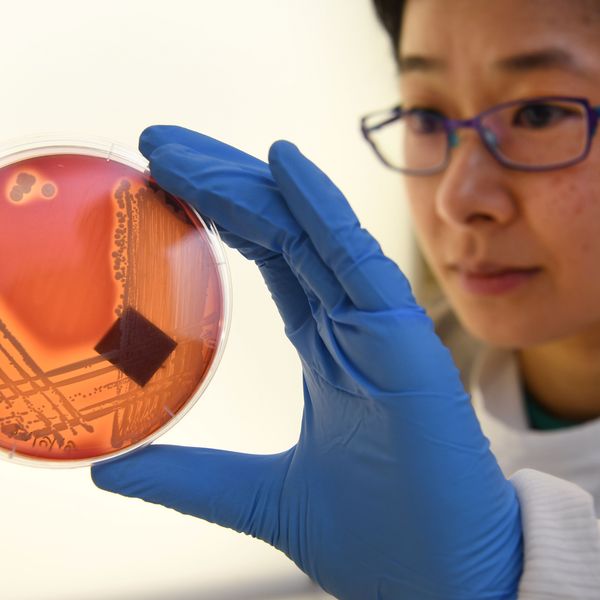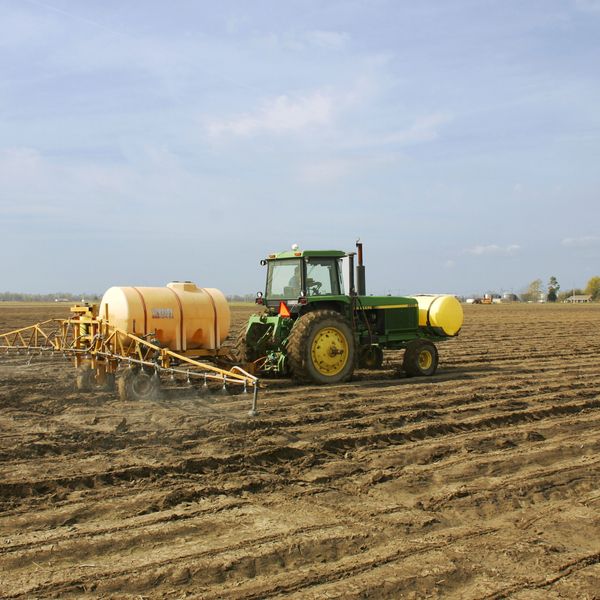FDA Concealed the 'High Risk' Livestock Antibiotics Pose to People
Documents obtained by NRDC show FDA documented danger but allowed antibiotics anyway

The scientific analysis, which was conducted between 2001 and 2010 by the FDA, was kept quiet and only made public when the Natural Resources Defense Council obtained the documents through a Freedom of Information Act request.
The FDA, which is the government body responsible for regulating the use of antibiotics in animal livestock, examined 30 penicillin and tetracycline additives --which play an important role in human medical care -- in animal feed.
They found that 18 of these additives are at "high risk" of exposing people to antibiotic-resistant bacteria through food consumption and constitute a danger to human health. In addition, the FDA found all 30 of the antibiotics would not meet requirements for approval today due to insufficient information about their safety for humans, and 26 of them would not satisfy the safety standards established by the FDA in 1973, according to an NRDC summary of the documents.
Yet the FDA took no meaningful action on these additives, according to the NRDC. As a result, "at least nine of these additives are being marketed today, and all but the two voluntarily withdrawn additives remain approved for use today," according to a statement released by the NRDC.
"The evidence is clear. Drugmakers never proved safety. And FDA continues to knowingly allow the use of drugs in animal feed that likely pose a 'high risk' to human health," said Carmen Cordova, NRDC microbiologist and lead author of the new NRDC analysis. "That's a breach of their responsibility and the public trust."
According to the Centers for Disease Control and Prevention, at least two million people in the United States fall sick and 23,000 die every year from antibiotic-resistant infections.
_____________________
An Urgent Message From Our Co-Founder
Dear Common Dreams reader, The U.S. is on a fast track to authoritarianism like nothing I've ever seen. Meanwhile, corporate news outlets are utterly capitulating to Trump, twisting their coverage to avoid drawing his ire while lining up to stuff cash in his pockets. That's why I believe that Common Dreams is doing the best and most consequential reporting that we've ever done. Our small but mighty team is a progressive reporting powerhouse, covering the news every day that the corporate media never will. Our mission has always been simple: To inform. To inspire. And to ignite change for the common good. Now here's the key piece that I want all our readers to understand: None of this would be possible without your financial support. That's not just some fundraising cliche. It's the absolute and literal truth. We don't accept corporate advertising and never will. We don't have a paywall because we don't think people should be blocked from critical news based on their ability to pay. Everything we do is funded by the donations of readers like you. Will you donate now to help power the nonprofit, independent reporting of Common Dreams? Thank you for being a vital member of our community. Together, we can keep independent journalism alive when it’s needed most. - Craig Brown, Co-founder |

The scientific analysis, which was conducted between 2001 and 2010 by the FDA, was kept quiet and only made public when the Natural Resources Defense Council obtained the documents through a Freedom of Information Act request.
The FDA, which is the government body responsible for regulating the use of antibiotics in animal livestock, examined 30 penicillin and tetracycline additives --which play an important role in human medical care -- in animal feed.
They found that 18 of these additives are at "high risk" of exposing people to antibiotic-resistant bacteria through food consumption and constitute a danger to human health. In addition, the FDA found all 30 of the antibiotics would not meet requirements for approval today due to insufficient information about their safety for humans, and 26 of them would not satisfy the safety standards established by the FDA in 1973, according to an NRDC summary of the documents.
Yet the FDA took no meaningful action on these additives, according to the NRDC. As a result, "at least nine of these additives are being marketed today, and all but the two voluntarily withdrawn additives remain approved for use today," according to a statement released by the NRDC.
"The evidence is clear. Drugmakers never proved safety. And FDA continues to knowingly allow the use of drugs in animal feed that likely pose a 'high risk' to human health," said Carmen Cordova, NRDC microbiologist and lead author of the new NRDC analysis. "That's a breach of their responsibility and the public trust."
According to the Centers for Disease Control and Prevention, at least two million people in the United States fall sick and 23,000 die every year from antibiotic-resistant infections.
_____________________

The scientific analysis, which was conducted between 2001 and 2010 by the FDA, was kept quiet and only made public when the Natural Resources Defense Council obtained the documents through a Freedom of Information Act request.
The FDA, which is the government body responsible for regulating the use of antibiotics in animal livestock, examined 30 penicillin and tetracycline additives --which play an important role in human medical care -- in animal feed.
They found that 18 of these additives are at "high risk" of exposing people to antibiotic-resistant bacteria through food consumption and constitute a danger to human health. In addition, the FDA found all 30 of the antibiotics would not meet requirements for approval today due to insufficient information about their safety for humans, and 26 of them would not satisfy the safety standards established by the FDA in 1973, according to an NRDC summary of the documents.
Yet the FDA took no meaningful action on these additives, according to the NRDC. As a result, "at least nine of these additives are being marketed today, and all but the two voluntarily withdrawn additives remain approved for use today," according to a statement released by the NRDC.
"The evidence is clear. Drugmakers never proved safety. And FDA continues to knowingly allow the use of drugs in animal feed that likely pose a 'high risk' to human health," said Carmen Cordova, NRDC microbiologist and lead author of the new NRDC analysis. "That's a breach of their responsibility and the public trust."
According to the Centers for Disease Control and Prevention, at least two million people in the United States fall sick and 23,000 die every year from antibiotic-resistant infections.
_____________________

